-
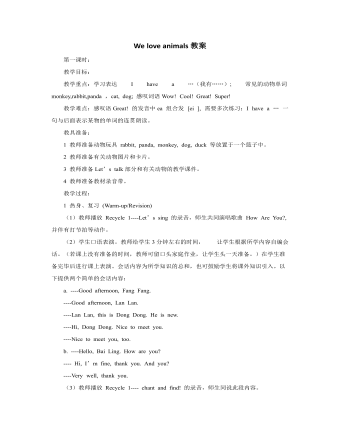
人教版新课标PEP小学英语三年级上册We love animals教案
(1)游戏:向它那儿跑去(Run to it!)首先,用图片和词卡练习本课的6个新单词。学生边读老师边把卡片贴在黑板上。将全班分成两队。给学生下一个Run to the bird.这样的指令。每队的第一个学生向带有鸟的图卡和词卡的地方跑,并且用手摸一下这两张卡片。哪组学生先摸到卡片就给他们队得一分。教师也可以用本课刚学的指令:Walk to….Jump to ….Fly to….等指令学生用相同的动作走(跳,飞)到卡片前。(2)教师将Let’s do的图片打乱顺序,让学生听指令,选出正确的图片。(3)游戏:照我说的做(Do as I say)教师发指令,全班同学起立做动作。做错的同学随时坐下。最后,哪组站着的同学多,哪组获胜。教师参考指令: Climb like a monkey/bear.Jump like a squirrel/rabbit.Walk like an elephant/duck.Hunt like a mouse/pig.Act like a cat/dog.Fly like a bird.为了增加游戏的难度和趣味性,教师可逐渐加快指令的速度。4.课堂评价(Assessment)做活动手册本单元第5部分的练习。方法和步骤参考第一单元。
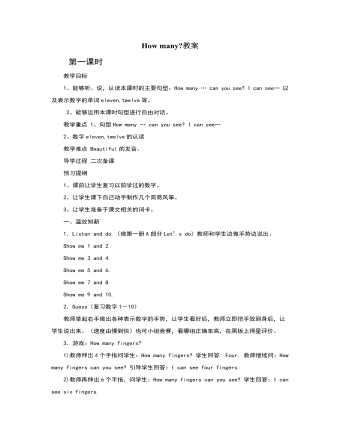
人教版新课标PEP小学英语三年级下册How many教案
一.温故知新1.教师播放“One, two, three, four, five”歌曲的录音带,让学生跟随录音一起唱。2.复习数字1-151)报数:教师让学生从1-15按顺序用英文报数,如果前一个学生报到15了,那么下一个学生就要从1再开始。2)游戏:叫号。教师把写有one —fifteen的单词卡发给学生,教师随意说数字,谁拿着相应的单词卡,谁就站起来并大声读出该单词。3.操练句型How many … can you see? I can see…和How many… do you have? I have…(使用15以内的数字)二.新课呈现 1.教师将1-15的数字卡贴在黑板上,用其中的两张组成一个算式,在两张数字卡的中间写上“+”号,其和为15以内,让学生去计算,如Ten and five is fifteen.2.让学生两人一组,一个学生摆算式,另一个学生用英文说出结果。3.教师出示算式卡,如Nine and seven,让学生快速说出两数之和,并请最先说出答案的学生将算式用数字形式写在黑板上,在单词卡中找到相应的单词贴在和的位置上。
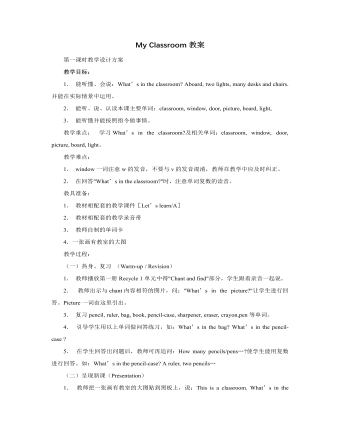
人教版新课标PEP小学英语四年级上册My Classroom教案
1、本单元要求会听,说,认读的单词: Window board light picture door floor classroom computer wall teacher’s desk fan what in the we have new go where2、本单元要求会听,说的单词和词组: Many our seat near classmate cleanhave a look good idea all right good job3、帮助学生在掌握单词的基础上造出句子,编出对话,学以致用。 4、培养学生用英语交流的能力,为学生的进一步学习奠定基础。 二、教学要求 1、能听懂、会说,会用每一课会话。 2、掌握本单元出现的生词,词组和字母。 3、会唱本单元的歌曲。 三、教学重点和难点 1、对于较长的单词如classroom, classmate, computer的掌握以及对于第一次出现的词组和短语如have a look, good job的掌握。2、对于礼貌用语“Thank you , Excuse me, After you”的掌握与应用。 3、描述教室中所有物件,并能据此编出对话。 四、教学时间 本单元共6课时,每周3课时,2周完成。 Lesson 1 1.Teaching Aims Let the students master the words: window, classroom, floor, light, door, board, and picture. When they see the objects, they can recognize and read them and do the action about them.
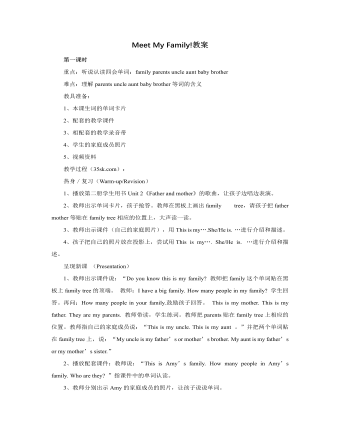
人教版新课标PEP小学英语四年级上册Meet My Family!教案
教案点评: 本课时在上一课时的基础上,进一步在情景中学习句型Is this your...? He/She looks... What’s he/she? They look... Are they...? 本课时的内容和学生的实际生活贴近,学生对该话题感到亲切,教学新句型时教师运用学生的家庭照片,在师生的对话中自然的呈现新知和操练句型,有助于学生更好的掌握和操练对话。本堂课教学层次分明,教师引导适当,发挥了学生在学习中的主体地位第六课时重点:单词nurse, doctor, farmer, driver的拼写。难点:I’m going to be a…教具准备:1.图片nurse, doctor, farmer, driver2.教材相配套的教学录音带3.单词卡片教学过程(35sk.com):一 热身/复习(Warm-up/Revision)1.口语练习:How many people are there in your family?Who are they?What are they?2.让学生改编B部分的chant, 然后表演出来。教师对表现出色的应即使给予奖励。二 呈现新课 (Presentation)1.教师出示表示表职业的单词卡让学生认读,并贴在黑板上。2.做找朋友的游戏。让学生把图片贴到相应的单词下。

人教版新课标PEP小学英语四年级下册At a Farm教案
(二)新课呈现:学生以小组的形式指着挂图汇报,每组只谈论一种动物。(教师为尽可能多的学生提供对话机会,鼓励学生尽可能不重复别人说过的。)在对话的过程中,教师将单词卡片cat,dog,rabbit,duck,pig适时呈现给学生,让学生拼读单词。然后启发学生将每个单词中的元音字母的发音说出来,从而帮助学生记忆单词,同时为Pronunciation的教学进行铺垫。教师适当讲解单词拼写中需特别注意的地方。rabbit双写b;duck中ck发[k]的音。做找朋友的游戏:方法一:教师说单词:cat,dog,rabbit,duck,pig,分别请五个学生站到前面做出5种动物的动作;将5个单词的卡片面朝下分别发给5个学生,教师说Start!5名学生分别翻开卡片,根据单词意思到前面去找自己的朋友。教师对完成准确而且速度快的同学进行表扬。方法二:教师将cat,dog,rabbit,duck,pig的图片和单词卡片分别发给十个同学,看看谁能在最快的时间内找到自己的朋友。教师要表扬配合最密切的两个同学。
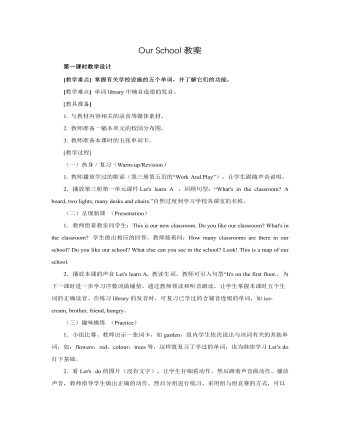
人教版新课标PEP小学英语四年级下册Our School教案
教学重点:Read and write 中的四个四会单词以及问句“Is this a teacher’s desk?”及其答句“Yes, it is.”在四线格中的正确书写。教学难点:拼读单词picture,在四线格中书写句型“Is this a …?”以及总结元音字母a的发音规则。教具准备:1.与教材内容相关的课件、声音、图片等媒体素材。2.教师准备相关的词卡。3.学生准备白纸和彩笔。教学过程(35sk. c om整理):(一)热身/复习(Warm-up/Revision)1.师生合唱该单元的歌曲和歌谣,边歌边舞。2.请学生表演Story time中的对话。3.猜谜语:教师给学生出一些简单的谜语,如:Jack is in a room. There are many books in it. He can see many students. They are reading books. They are quiet. Where is Jack?(二)呈现新课 (Presentation)1.请学生观察Read and write部分的情景图,预先空出来需要书写的四会单词,让学生独立思考,填充对话。
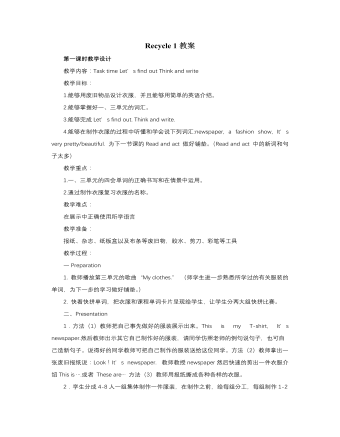
人教版新课标PEP小学英语四年级下册Recycle 1教案
1.Think and write接上一个环节,老师说“Zoom is careless. Where are his things? Let’s look.” 让学生看课本图片,认真观察。a. 教师给出例句,请同学仿照例句说出句子Zoom’s red shoes are in the library.Zoom’s green sweater is in the gym.b.学生完成课本图片后的短文。可以找程度好的同学在黑板上书写。c.让学生在小组内朗读句子。2. Let’s read..出示钟表模型,老师拨出几个有代表性的时间,学生分两组用“What time is it ? It’s ........It’s time to ……”进行问答。老师在学生回答时把时间和活动写在黑板上如下:Time Activities7:00 get up 7:30 go to school9:00have Chinese/math class10:00read books 或其他12:00 eat lunch3:15have P.E classOh, you have a busy day. Look, this is John’s day.a. 由上个环节引出John’s list. 教师引导学生仔细看Let’s read 部分的图,阅读John的活动时间表, 然后独立完成句子的正误判断,最后进行检查。b.让学生再次读John的活动时间表,回答下面的问题:What time does John go to school? Where does John read books?
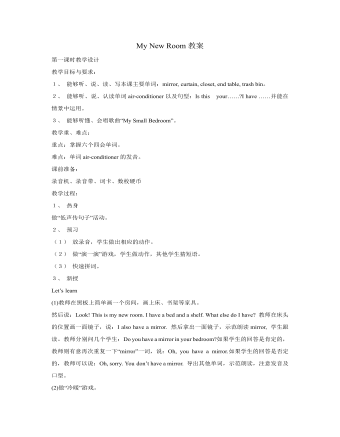
人教版新课标PEP小学英语五年级上册My New Room教案
Let’s learn(1)教师在黑板上简单画一个房间,画上床、书架等家具。然后说:Look! This is my new room. I have a bed and a shelf. What else do I have? 教师在床头的位置画一面镜子,说:I also have a mirror. 然后拿出一面镜子,示范朗读mirror, 学生跟读。教师分别问几个学生:Do you have a mirror in your bedroom?如果学生的回答是肯定的,教师则有意再次重复一下“mirror”一词,说:Oh, you have a mirror.如果学生的回答是否定的,教师可以说:Oh, sorry. You don’t have a mirror. 导出其他单词,示范朗读,注意发音及口型。(2)做“冷暖”游戏。(3)教师在黑板上示范书写单词:mirror, curtain, closet, end table, trash bin,让学生在词卡反面或练习本上拼写、记忆单词。(4)播放本课录音,让学生在书上手指相应单词并跟读。巩固延伸:做句型接龙游戏;做“找同伴”活动;学唱歌曲;完成配套练习;练习书写单词第二课时教学设计教学目标与要求:1、 能够听懂、会说本课对话,并能做替换练习。2、 能够听、说、认读句型There is a ……/There are …并能在情景中正确运用。3、 了解Good to know内容。
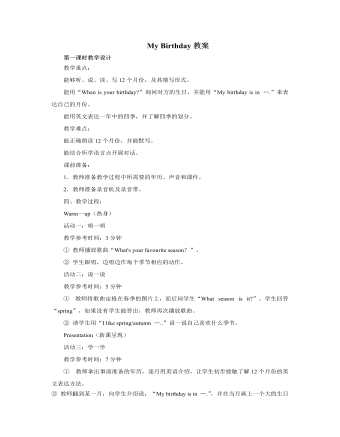
人教版新课标PEP小学英语五年级下册My Birthday教案
① 教师询问学生“What day is today?”,学生说出“Today is …”。而后又问学生:“What’s the date?”,帮助学生说出今天的具体日期:“It’s …”。 ② 让学生拿出课前准备的年历(最好是学生自己制作的),教师随意指着某天询问学生:“What’s the date?”,而后请学生拿着年历相互用“What’s the date? It’s ….”进行问答练习。③ 教师拿着年历从一月开始问学生:“Who has a birthday in January? Please stand up.”,而后教师问起立的学生:“What’s the date?”,让一月份生日的学生答出具体日期。④ 请若干名学生代替老师进行提问,从二月到十二月。活动四:Let’s talk教学参考时间:8分钟① 教师播放对话录音两遍,而后提问:“When is Sarah’s birthday? When is Zhang’s birthday?”,学生根据对话内容回答出:“Sarah’s birthday is in October1st. Zhang’s birthday’s is in March12th.”。 ② 学生跟读对话,两人一组做对话练习。 ③ 学生根据同学的生日组织一个新的对话,教师请若干组展示他们的对话。
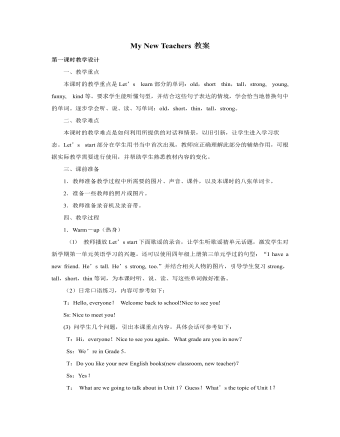
人教版新课标PEP小学英语五年级上册My New Teachers教案
教师播放Let’s learn课件,提问:Guess, what does Wu Yifan do on Saturdays? 请3-4人回答后。用同样方法完成watch TV, read books,请学生听并且跟读。继续看课件,播放两个男孩的对话,请学生听并跟读,注意语音、语调。 在句子中练习单词,培养学生的表达能力。对话练习听录音中的对话 1-2遍,请同学说一说对话的内容。可选择自己喜欢的角色进行人机对话。分组练习,向你的朋友询问。培养学生的模仿力,并能在恰当情境中灵活运用所学句型。Let’s chant B出示B部分的歌谣,请学生小声试读,可以读出不同的节奏。播放歌谣,请学生仔细倾听2-3遍,说到相对应的地方,教师带领学生指一指画画、看电视、读书、玩电脑游戏这四种情景,帮助学生理解歌谣。请学生反复跟读。分角色演唱,可拍手掌握节奏。 看一看、说一说帮助学生巩固本课句型。转盘游戏教师拿出课前制作好的大转盘,上面有do homework, watch TV, read books这三幅图画。请一名学生拨动转盘,转盘快速转动,停止时看指针指向哪一幅图,该生提问What do you do on Sundays?其余同学回答,先回答出的同学可拨动转盘,游戏继续。
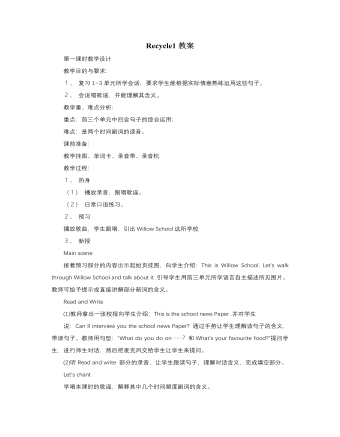
人教版新课标PEP小学英语五年级上册Recycle1教案
巩固延伸尝试与他人进行书信交流第三课时教学设计教学目的与要求:1、 能够使用所学四会句子完成Task time中的采访任务。2、 能够理解Let’s play中的问题并做出正确回答。3、 能够听懂、会唱歌曲“My Favourite Day”。教学重、难点:重点、难点为复习并使用四会句子完成Task time中的采访任务,并展示个人报道。课前准备:教学挂图、录音带、录音机、简历表教学过程:1、 热身(1) 放第二单元歌曲,学生跟唱,复习有关一周七天的单词。(2) 日常口语练习。2、 预习:放录音,欣赏歌曲。3、 新授Task time(1) 就歌曲内容向学生提问:Do you like weekends? What’s your favourite day? 引导学生回答:My favourite day is Saturday/Sunday. 并请学生说明理由,表述周末活动。出示采访表,回答问题。(2) 让学生参照学生用书的采访表进行小组交流,并在最短的时间内填充表格,然后每组派代表做汇报。Let’s play看图片,指导学生先读懂句子,再回答问题。Let’s sing学生理解并学唱本单元歌曲“My Favourite Day”.巩固延伸:采访教师;画画猜人
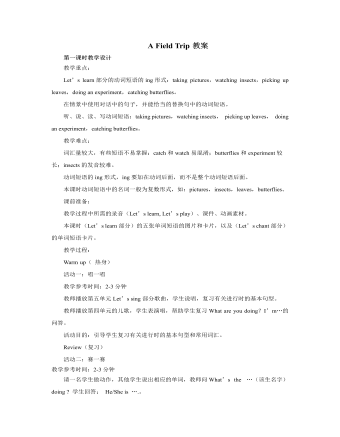
人教版新课标PEP小学英语五年级下册A Field Trip教案
活动八:Story time:教学参考时间:5-7分钟打开书,学生自己阅读故事。两人一小组,尝试初步朗读。小组间互相提问回答:一人问,另一人回答。有两个人都不明白的问题,向全班提问。教师提问:(如果这些问题已经被同学问过了就不用再问了。)Is Zoom reading a book?Is he fishing?Are the frogs playing in the river?Are they catching mosquitoes?What are the frogs doing?教师播放故事录音,学生跟读。教师启发学生说一说从故事中学到了什么。教师要适时告诉学生青蛙是人类的朋友,要爱护青蛙。活动目的:Story time的教学,是培养学生阅读能力的有效载体,教师应充分利用。教师要给孩子充分的时间让孩子能够实实在在的进行阅读,从阅读中获得信息。经过了两年的学习,学生应该具备了初步的阅读小故事的方法,因此教师可以引导有能力的学生在原有的基础上,运用已经学过的语言,对故事进行简单的复述。这样做一方面可以检查学生理解的程度,另一方面可以进一步培养、锻炼学生的语言表达能力。
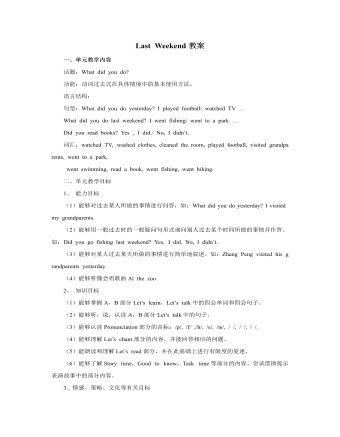
人教版新课标PEP小学英语六年级下册Last Weekend教案
一、教学内容:Part B Let’s learn Let’s play. Part C Task time Let’s check 二、教学目标与要求 1、掌握四会词组:went to a park, went swimming, read a book, went fishing, went hiking. 2、学会用句型What did you/ (name) do last weekend/ yesterday? I(name) (did) last weekend/ yesterday. Did you….? Yes, I did. 来进行问答并完成Task time的表格。 三、教学重点 掌握四会词组,并用所学词组和句型进行调查 四、教学难点 掌握四会词组(不规则动词过去式变化),并用所学词组和句型进行调查 五、课前准备 1、教师准备所需的词卡及图片。 2、学生准备词卡。 六、教学过程 1、Warm-up 1) Free-talk: T: What day is today? A: Today is… T: What day was yesterday? (强调 yesterday) B: Yesterday/ It was… T: What did you do yesterday? C: I (did)…yesterday. ( 用前几课时已经学的词组) 2) Chain-drill: C: I (did)…yesterday. What did you do yesterday? D: I (did)…yesterday. What did you do yesterday? E, F… (ask the teacher) T: I went to a park yesterday. 2、Presentation and practice let’s learn (1)继续Chain-drill,由T 引出并出示新授词组:went hiking. (2)学生已经了解了go 的过去式后, T 边用I went ( 这个动词用动作表示)yesterday.表达自己昨天去做什么了,边做动作.让学生帮老师说出: went swimming, went fishing.
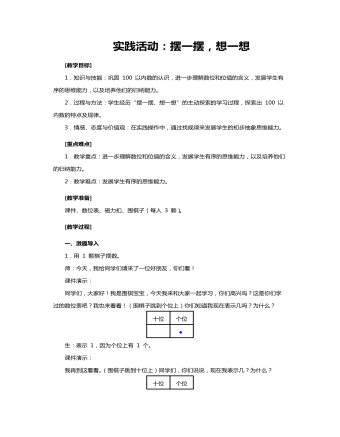
人教版一年级数学《实践活动摆一摆,想一想》教案
[教学目标]1.知识与技能:巩固 100 以内数的认识,进一步理解数位和位值的含义,发展学生有序的思维能力,以及培养他们的归纳能力。2.过程与方法:学生经历“摆一摆、想一想”的主动探索的学习过程,探索出100 以内数的特点及规律。3.情感、态度与价值观:在实践操作中,通过找规律来发展学生的初步抽象思维能力。[重点难点]1.教学重点:进一步理解数位和位值的含义,发展学生有序的思维能力,以及培养他们的归纳能力。2.教学难点:发展学生有序的思维能力。[教学准备] 课件、数位表、磁力扣、围棋子(每人3 颗)。[教学过程]一、激趣导入1.用 1 颗棋子摆数。师:今天,我给同学们请来了一位好朋友,你们看!课件演示:同学们,大家好!我是围棋宝宝,今天我来和大家一起学习,你们高兴吗?这是你们学过的数位表吧?我也来看看!(围棋子跳到个位上)你们知道我现在表示几吗?为什么?生:表示 1,因为个位上有 1 个。
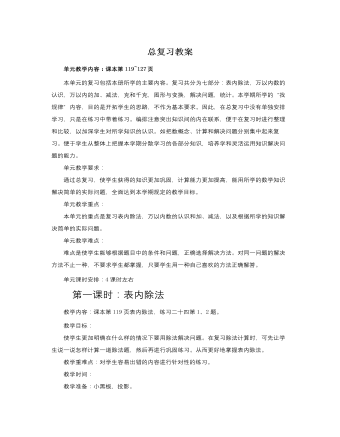
人教版新课标小学数学二年级下册总复习教案
教学时间:教学准备:小黑板,挂图。教学过程:一、复习旧知,引入新课。1、请大家想一想到今天为止,我们已经复习了本学期学过的哪些知识?(表内除法。万以内数的认识和加法、减法。克和千克及图形的变换。)2、对这些知识还有没有什么问题?还有没有内容是我们没有复习到或复习了掌握不好的?如果学生有问题,则针对问题,让同学们一起来想办法解决这些问题。学生提出问题,思考解决方法。二、复习整理:1、分别出示教材第122页第13、14题的挂图。(如果没有,就让学生直接看书)(1)看了图后,你明白图中的画是什么意思吗?学生看挂图,小组讨论这两题的意思。叙述两幅图的意思,没有说好的请其他同学来补充完整。在小组内讨论交流。(2)怎样来解决这两个生活中的实际问题?
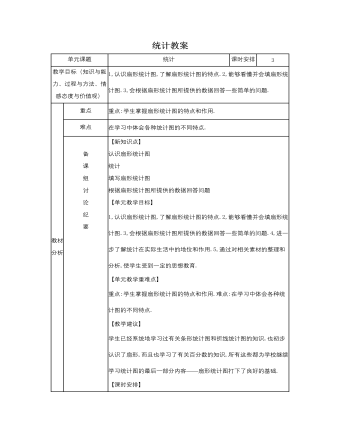
人教版新课标小学数学六年级上册统计教案
【新知识点】认识扇形统计图统计填写扇形统计图根据扇形统计图所提供的数据回答问题【单元教学目标】1,认识扇形统计图,了解扇形统计图的特点.2,能够看懂并会填扇形统计图.3,会根据扇形统计图所提供的数据回答一些简单的问题.4,进一步了解统计在实际生活中的地位和作用.5,通过对相关素材的整理和分析,使学生受到一定的思想教育.【单元教学重难点】重点:学生掌握扇形统计图的特点和作用.难点:在学习中体会各种统计图的不同特点.【教学建议】学生已经系统地学习过有关条形统计图和折线统计图的知识,也初步认识了扇形,而且也学习了有关百分数的知识,所有这些都为学校继续学习统计图的最后一部分内容——扇形统计图打下了良好的基础.【课时安排】
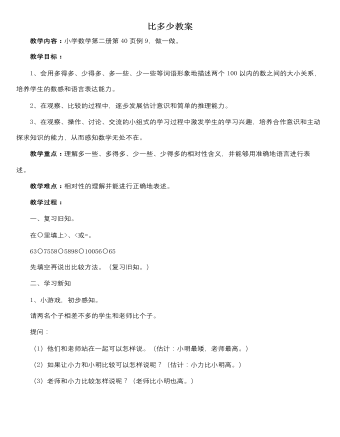
人教版新课标小学数学一年级下册比多少教案
教学目标:1、会用多得多、少得多、多一些、少一些等词语形象地描述两个100以内的数之间的大小关系,培养学生的数感和语言表达能力。2、在观察、比较的过程中,逐步发展估计意识和简单的推理能力。3、在观察、操作、讨论、交流的小组式的学习过程中激发学生的学习兴趣,培养合作意识和主动探求知识的能力,从而感知数学无处不在。教学重点:理解多一些、多得多、少一些、少得多的相对性含义,并能够用准确地语言进行表述。教学难点:相对性的理解并能进行正确地表述。教学过程:一、复习旧知。在O里填上>、<或=。63O7558O5898O10056O65先填空再说出比较方法。(复习旧知。)
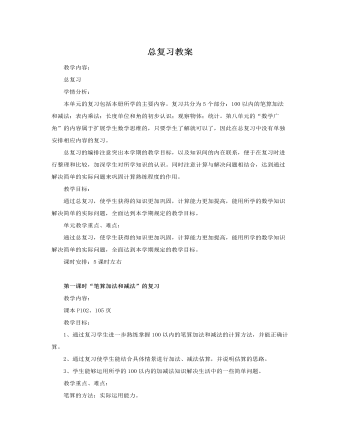
人教版新课标小学数学二年级上册总复习教案
教学内容:课本P104、108页。教学目标:1、通过复习使学生加深了解统计的意义。2、巩固学生对条形统计图的认知,明确用1格表示2个单位的表现形式,能根据统计图提出问题。3、在学习过程中培养学生的实践能力与合作意识。教学重点、难点:1、在复习中进一步了解统计的意义,加深对条形统计图的认识。2、能根据条形统计图的条件提出数学问题。教学过程:一、复习统计1、观察讨论(1)、教师出示条形统计图:这张图叫什么名字?它有什么作用?仔细观察统计图你有哪些发现?(2)、学生观察讨论,思考,依据自己的体验回答。仔细观察统计图,在小组内交流自己的发现。(3)、组织全班汇报交流,梳理统计图信息。2、回答问题根据条形统计图上的信息,你能回答下列问题吗?1)、最受二年级同学欢迎的饮料是什么?你是怎么看出来的?2)、喜欢哪两种饮料的人数同样多?你是怎么知道的?
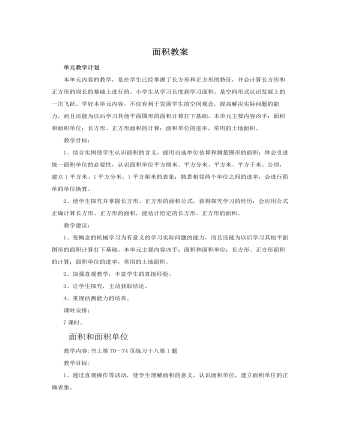
人教版新课标小学数学三年级下册面积教案
教学内容:书上第84页公顷、平方千米教学目标:1、让学生知道公顷、平方千米是更大的面积单位,了解1公顷、1平方千米的实际大小。2、知道1公顷=10000平方米,1平方千米=100公顷。3、培养学生的空间观察和动手操作能力,培养学生的爱国主义情感。教学重点:使学生了解1公顷、1平方千米的大小。掌握土地面积单位间的进率。教学难点:建立1公顷及1平方千米的实际概念,能区分两个单位。教学准备:课件教学过程:一、巩固旧知,作好铺垫。1、常用的面积单位有哪些?2、用打手势表示一下1平方厘米、1平方分米、1平方米的大小。3、填写正确的面积单位:指甲的面数学书本的封面黑板的面二、引入:同学们,我们一起来看看体育场的图片,你们有什么感想?出示:(体育场太大了)那还能用我们前面学过的面积单位进行测量吗?这就是我们今天要学的比平方米更大的面积单位:公顷和平方千米。(出示课题:公顷、平方千米)三、新授1、通常我们在测量土地面积时,要用到更大的面积单位,公顷和平方千米。它们到底有多大呢?这节课我们就来了解一下。
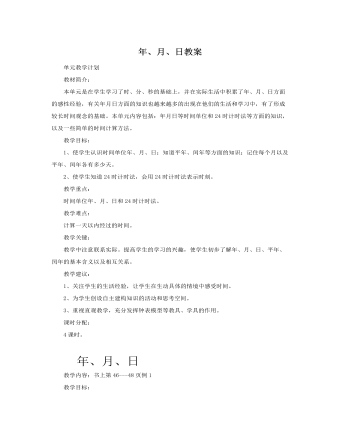
人教版新课标小学数学三年级下册年、月、日教案
大家请看,钟面上现在表示的是几时?(下午1时)下午1时我们还可以怎样表示?(13时)下午1时就是13时,你是怎么想到用13时表示的?在一日内,由于第一圈走了12小时,所以时针在走第二圈时,我们就要把时针指的钟面上的时刻数分别加上12,这就是我们今天要学习的24时记时法。比如,现在钟面上是下午1时,根据24时记时法就应该是?(13时)。那么下午2时、3时、6时、晚上7时30分、9时50分用24时计时法怎样表示?你是怎样想的?(继续看画面。)这时,同学们又开始了下午的学习生活。16时,同学们结束了一天的学习,回到了家中。时间一晃就到了21时,也就是我们常说的夜间九点。这时我们又该上床休息了。时间一分一秒地过去了,又是午夜12点,夜深人静,一天又过去了。这种用0时到24时来表示一天时间的记时方法我们就把它叫做24时记时法。师小结:同学们,一天的时间很快就会过去,我们要珍惜时间,合理地安排好一天的作息时间。4、观察钟面:你发现了什么?(同一指针可以表示晚上12时、0时、24时。)抽几个时间板书。观察普通计时法和24时计时法,发现他们有什么区别呢?同桌之间互相交流一下。

